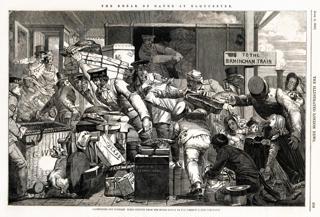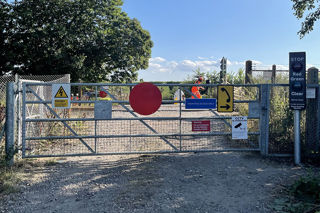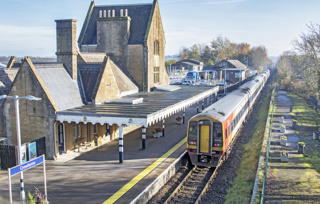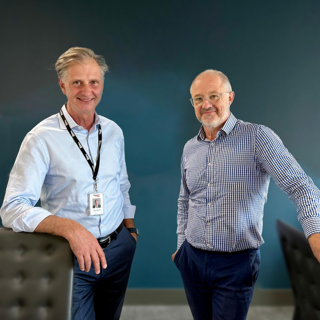Anit Chandarana has an opportunity to drive change. As Chief of Staff in the Great British Railways transition team, he is one of a handful of people tasked with shaping the new organisation that will run the industry.
Chandarana (50) admits that he hasn’t seen his ethnicity as an issue through most of his working life. Having risen to the top table of a national institution, clearly the colour of his skin hasn’t interfered with his career.
Or has it? Only in the past couple of years has he embraced what he sees as difficult questions and chosen to establish himself as a role model for others.
He volunteered for a conversation to tackle difficult questions head-on. Nothing is off-limits, and Chandarana admits that he finds the experience personally challenging.
A private man, he has previously been reluctant to confront the way he has dealt with his Indian background and how it has shaped his work. But he has been reassessing who he is, and what he feels he should achieve in his life.
Chandarana describes himself as Indian British. He was born in East Africa. His grandfather was born in India and moved to Uganda as part of the British Empire. If fact, he went there to build railways.
Chandarana’s family were part of the Indian exodus from Idi Amin’s rule in the 1970s, arriving in the UK as refugees. So, apart from his very earliest childhood, he has been British.
He joined the railway in 2003, at the age of 32. And he has been listed by the Financial Times as one of the top 100 leading minority ethnic executives.
RailReview: How have attitudes towards your background changed, from the time you came into the rail industry to how you find them today?
Anit Chandarana: I am more conscious of my ethnic background than I used to be. I used to live in blissful ignorance. I lived in a bubble. I never noticed any differences in the railway that particularly worried me.
Then I started noticing things. Like the lack of senior people from diverse backgrounds. Or in discussions and group sessions, who got to speak and who didn’t.
For me, the big difference is that we now recognise the issues. Previously it didn’t matter as much as it should have done. There is now a really strong desire to look at things from a different perspective. Having uncomfortable conversations between ourselves is now part of how we operate. We face up to difficult truths.
How have you noticed that personally? How has it affected you?
I now recognise my function as a role model for people from diverse backgrounds. I was pretty dismissive of it before - I’m not now.
It was George Floyd and the Black Lives Matter events of last year that really brought that to me. There was a strong surge of people from ethnic minorities responding to that, and that’s my own diverse characteristic.
People were approaching me, saying it was important for them to have a role model, that it was important for them to know it is possible to reach my level in the organisation.
I now know it’s not about me standing up, saying “look at me” - I am not that sort of person at all. It’s about using my voice - for example, at executive committee meetings. I recognise that until quite recently, I was not playing my part.
We did a piece of work last year. There were some horrific findings. People from ethnic minorities were systemically coming out of performance reviews with worse outcomes than their white counterparts. They were not being as successful in internal job applications as their white counterparts. We saw higher levels of job applications, but lower levels of converting those applications into job offers.
There may have been some legitimacy in those outcomes - perhaps some types of people were applying too early, people who weren’t yet ready for the role. But even after removing that, these results were not good.
I felt we should not shy away from the reality of what that told us. One of the reasons for an organisation believing in diversity is that it has a business case. That’s a great by-product. But it’s not the reason for encouraging diversity. Slavery had a really strong business case. No, the reason for encouraging diversity is a moral one.
You now sit at the top table in this industry. As you have risen in seniority, has the way you are treated by others changed?
Sitting around the executive table, you have a more powerful voice. It comes with the role.
This is about finding my own courage to speak about my experience. Previously I hid it away. I wouldn’t have talked about my own difficulties in growing up and maturing. I saw them as my problem, not a societal problem. As you grow in seniority, you learn that it is OK to have some difficult views.
I think what changes most is that at a more senior level you develop a more natural ability to be heard. It was much more difficult to speak out of turn when I was at more junior levels.
I’m very aware of how this conversation may appear to others. I’m a white, middle-class, educated British chap living in the countryside and wearing tweed, having a conversation about race relations.
I look at myself, and believe I have no personal bias or antipathy towards anyone of a background or culture different from my own.
But, of course, I have an unconscious bias that is built-in, because of how and where I grew up. And the railway is dominated by people like me: middle-aged white men.
When you look at me, how do you think I need to change my behaviour to neutralise that unconscious bias?
The truth is that all of us have unconscious bias. Sometimes it matters and sometimes it does not. I’ve done some work on my own unconscious bias. When I recruit, I have a bias towards white applicants. How ironic is that?
One reason is that when I was growing up, there was a culture of assimilation. To get on, I was taught, don’t show your difference. Fit in. Be like others. That’s what my parents believed.
So, in the following round of recruitment, I asked our HR people to make the CVs anonymous. I found the people I shortlisted were entirely different to those I would have shortlisted had I known their identities. Given who I am, if I show an unconscious bias, then it’s likely that everyone else does, too.
It didn’t take much to change that. Awareness is the key. As soon as I recognised it and was prepared to talk about it openly, I caught myself and took my own vices into account.
That’s really all we are asking for. We don’t need people to take a fundamental shift in behaviour. Small adjustments in awareness are sufficient for most people. Recognising that these things are personally uncomfortable, as you have done, and then talking about them, is generally enough.
What made you choose to do this: to submit to this level of personal scrutiny? You’re at the peak of a successful career, you’ve risen to the top of the heap, in a way that anybody from any background might aspire to do. It would appear that your cultural background has not held you back.
If you don’t dare speak about something, you can’t blame anyone else for not voicing it. Or criticise them for failing to respond to something you didn’t say. For too long, I think, I was not prepared to talk about uncomfortable things. I now recognise that as selfish.
There’s an element of giving people hope. It’s also about working out where I put barriers in front of myself, and perhaps those barriers did not need to be there.
Perhaps they didn’t even exist: were they real or perceived? Did I hold myself back, or did the system do so?
Have I had to work harder or smarter than a white counterpart?
If you’re preparing for an interview, you need to think of situations where your ethnicity may play a part.
What I hope I am showing you is that voicing these concerns shows I am the kind of individual who is prepared to take on a difficult situation and work with it. That in itself can promote success.
You’re avoiding eye contact as you talk to me, especially when I ask for your personal experience rather than a professional perspective. You’re giving the impression that this conversation is a long way outside your comfort zone.
Oh, massively. You’re dead right, Paul. It goes back to the way I dealt with difficulties before. I built a wall. I dealt with them, put them behind that wall. The George Floyd thing in particular, put chinks into that wall and brought back some bad memories. Memories of being in some quite physically intimidating situations. I changed my behaviour to deal with that. Even if that was the only way to deal with it back then, not dealing with it now was a selfish, privileged attitude to take.
I have an 18-year-old son and a 15-year-old son. They are now beginning to understand that barriers still exist in this country. It really hurt me to realise that I was not doing anything to solve their problems.
As a parent, that was sobering. I had a sense that I had not been playing my part. That was an awakening. I am senior now. I am in a position to do something about it, and until recently I have not been doing it.
We talk a lot more now about diversity of gender, of sexual orientation, of people born of one gender subsequently identifying as another. We talk more about how that is dealt with, or how it isn’t, in the workplace. We talk about where the boundaries of acceptability should be. Fit your ethnicity concerns into that wider context on the railway.
I think we can put less emphasis on disability, because we already do a lot to accommodate that. We are quite good at it, both for passengers and employees.
I don’t have a sense that ethnicity is a lost characteristic. Wind back five years. We reached a view that if we concentrate hard on one characteristic, what we learn will bleed across into all characteristics. We concentrated a lot on gender diversity. We made good inroads. But now I think that was flawed. It appeared we cared less about ethnicity than we care about gender or disability. That probably wasn’t true, but it was the impression.
And it creates another issue. Do white, middle-class, middle-aged men now feel like a group being left behind as a consequence? Because so much effort is being put into everyone else but them? That’s a risk.
I think, where I sit, we are pretty balanced now. The industry at large: I am less sure about that.
How far do we have to go? With gender, we have gone to a point where we are comfortable. Sexuality? In terms of homosexuality, I think we are OK. Transgender? I think we are still struggling to accommodate it in an appropriate way. And on ethnicity I think we still have a way to go as well.
The gap between where we are and where we need to be is wider on ethnicity than it is on gender.
When I have written about gender imbalance on the railway before, people in London have told me there is none. Even the unions have said that.
The further from London or the other big metropolitan centres I went, the more that story changed. The imbalance was far greater in the South West or North East, where the railway remains much more male-led and male-dominated, and the caricature of the old white bald man in charge held much more true.
I don’t have statistics to back up this assertion, but I suggest that is also true for ethnicity.
Good shout. Absolutely. No question. Our aspiration is to reflect the communities we work within. And it is tempting to think that as you go away from the metropolitan areas, the ethnicity issues fall away - especially outside London, Birmingham and Manchester.
But Glasgow is ethnically very diverse, yet our railway population there is nowhere close to reflecting that. The team up there have begun to recognise the issue. And you’re absolutely right, this applies to gender and other characteristics, too.
To what extent do you think that matters? You are executive sponsor of Network Rail’s cultural fusion network. I read that, but I don’t understand what that actually means or what it achieves.
That’s our employee network. We told our employees that we needed a more powerful voice for people from diverse backgrounds. It has grown from being not just a discussion, but a place where minority groups have a safe space for difficult conversations, and from where we can develop a consistent voice.
Now we are asking for that to be part of the mechanism by which our employees hold us to account. Keeping the promises that we are making. The staff network is voluntary, but it has a chair and what feels like a trustee group, and they bring issues to a head.
During COVID, that network has acted as a way of bringing ethnic minorities together, creating allies. They created something called a D-break. At 1100 every day, they created a virtual tea or coffee break to chat about what’s going on. It’s a place where we can bridge what may be quite a chasm between our executive and people in the real life of Network Rail. Because it can feel quite scary to be a voice out on your own. This is a way to put voices together.
We are about to go through a period of administrative upheaval, with the creation of GBR. It is both a challenge and an opportunity. How will you ensure that the issues we’ve been talking about for nearly an hour are taken into account as the new structure is established?
I am chief of staff to Andrew Haines. I have a formal role in the GBR transition team, which is a tiny group of four or five of us who are beginning the process.
You’ll know from the Williams-Shapps report that diversity is something they highlight. Diversity is a headline objective for us as we set out what GBR should be, both in diversity of background and diversity of industry recruitment. We are quite insular as an industry.
My personal objective is to drive this. And turn a corner in how we recruit people. How we develop a definitive culture that is different from the one we are inheriting from the industry as it is today.

















Login to comment
Comments
No comments have been made yet.